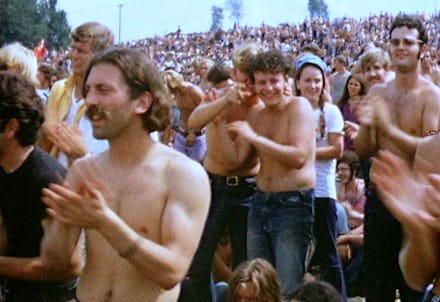There's a "Magic Age" When You Find Your Musical Taste, According to Science

Every human has a "critical period" for language development, a time in their lives when they can easily assimilate a new tongue. And just as there's a critical period for learning a language, so too is there a critical period for learning your musical tastes: It starts at 14 and peaks at 24.
"Fourteen is a sort of magic age for the development of musical tastes," Daniel J. Levitin, a professor of psychology and the director of the Laboratory for Music Perception, Cognition and Expertise at McGill University, told the New York Times. "Pubertal growth hormones make everything we're experiencing, including music, seem very important. We're just reaching a point in our cognitive development when we're developing our own tastes. And musical tastes become a badge of identity."
The music 14-year-olds listen to helps them define the boundaries of themselves and their friend groups. Scientists have actually drawn up quantitative measures that can anticipate an individual's musical preferences based on their personality traits. Peter J. Rentfrow and Samuel D. Gosling from University of Texas at Austin have found, for example, that those with more rebellious natures and higher degrees of "self-perceived intelligence" gather around the irreverent aggression of groups like the Dead Kennedys or Death Grips. More agreeable, social and attractive people tend latch onto more popular styles with wide appeal, like Madonna, as the research mentions, or a more modern-day equivalent like Jessie J, Ariana Grande or Nicki Minaj.
The hormonal impetus of puberty sets children down a path of rich musical discovery, guided by their personality and social needs, which deepen and complicate until about age 24, when they reach the peak of musical taste acquisition. Individuals tend to be most open-minded and accepting around this age. They're also being exposed to the widest range of musical influences, meeting people from diverse backgrounds on college campuses or at their work. The music that people consume during this age takes on a "special resonance." Elderly people are more likely to express admiration for music that they heard in their 20s over music they heard earlier or later in life. After 24, people stop acquiring as much new music, or if they do, they do not report as much preference or pleasure from it.
Part of the reason for this gradually decreasing pleasure is structural. Starting at 24 or 25, people's ears begin to lose sensitivity to higher pitches and become less adept at detecting small changes in pitch. Therefore, all the music that people are introduced to during this period sounds just a little less vibrant than did the music they heard during the peaks of their lives. Music heard at 19-24 also gets encoded with all sorts of glorious memories from when people are in the primes of their lives, feeling free and accumulating their first truly meaningful sexual, creative and professional experiences. That's one of the many reasons parents through the ages have hated their children's music.
But the biggest reason we stop accumulating new musical preferences after 24 is that people's personalities start to firm up. People become sure of their identities and stop seeking to challenge them. Their friend groups begin to solidify, and since our musical tastes are influenced tremendously by the people around us, when our social circles become static, so too do our musical preferences.
So listen carefully to the music you're enamored with now. Whether it's that new FKA Twigs or Iggy Azalea's host of summer bangers, surround yourself with good people and good music — they will be with you the rest of your life.